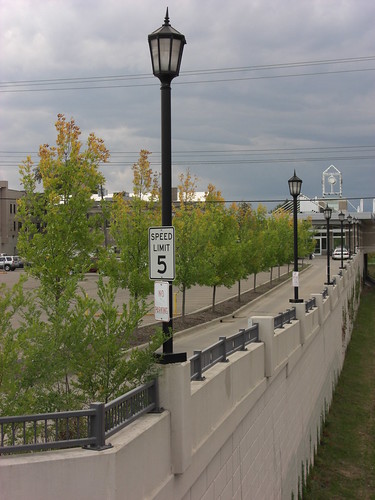The
Washington Post has a
good piece on
Phillip Johnson, retired Berkeley law professor and proponent of Intelligent Design Theory. Michael Powell, the piece's reporter, does a fine job at highlighting Johnson's irascible personality, strong objections to Evolutionary Theory, and his place within the scientific sphere. But, more than that, the piece offers an interesting structure: it narrates Johnson's life in
evolutionary terms.
The article begins where much of evolutionary science must begin: with an awareness of the present. Powell neatly starts his piece with a description of the scene he arrives at, when he meets up with Johnson for an interview:
BERKELEY, Calif. "The Washington Post is not one of my biggest fans, you know that."
Hello?
The Washington Post reporter has just walked out of a spray of Pacific-borne rain into the living room of a modest bungalow west of downtown. There's a shag rug, an inspirational painting or two and Phillip Johnson, dressed in tan slacks and a sweater and sitting on a couch.
Third person objective point of view. Very scientific. This blogger can almost imagine the reporter entering this strange scene and examining this even stranger beast, the Intelligent Design Theorist.
Powell continues with a description of how Johnson and Intelligent Design Theory currently intersect with Evolutionary Theory :
Johnson and his followers, microbiologists and geologists and philosophers, debate in the language of science rather than Scripture. They point to the complexity of the human cell, with its natural motors and miles of coding. They document the scant physical evidence for the large-scale mutations needed to make the long journey from primitive prokaryote to modern man.
They've inspired a political movement -- at least 19 states are considering challenges to the teaching of Darwin's theory of evolution.
None of which amuses evolutionary biologists, for whom intelligent-design theory inhabits the remotest exurb of polite scientific discourse. Darwin's theory is a durable handiwork. It explains the proliferation of species and the interaction of DNA and RNA, not to mention the evolution of humankind.
Like any young person fresh from her visit to the zoo, we now know what lion and tiger and beast walks among us, but we hardly know where they came from. Looking at the record, Powell begins to piece things together:
Johnson's early life was, by his own accounting, a rationalist lad's progress. He grew up in Aurora, Ill., a cocky kid so razor sharp that after his junior year in high school he packed off to Harvard. "I attended church in high school, but it was just part of the culture, like the Boy Scouts," he says. "We'd drop my father off at the golf course on the way to church."
He finished Harvard and then law school at the University of Chicago, where he graduated first in his class. He dabbled in Christian philosophy, read some C.S. Lewis. "I found it mind-stretching but I remember thinking: It's a real shame it's not true." Johnson became a clerk to Chief Justice Earl Warren at the Supreme Court. In 1967, with a wife and two young children, he went west to Berkeley, where he would gain international renown as a teacher of criminal law and legal theory.
Starting from the very beginning, looking at the “progress” Johnson’s life made, allows us to better understand how Johnson got to be where he is today. How much, I wonder, did Harvard, Chicago’s law school, and a wife and family adapt Johnson’s “razor sharp[ness]? Not much, apparently. But changes were occurring within the world and his life, nonetheless:
Johnson possesses a tenured professor's inability to hold his tongue, whether assaying a reporter's dumb question or his own life's arc. In the 1970s, Berkeley was roiling. Johnson opposed the Vietnam War but grew disillusioned and turned right. His wife, an artist, found feminism and wandered another way. Their marriage swept away like flotsam.
"I had been very happy for a long time," he says. "I was shaken to my core."
Examining his life’s arc, that curved path that Johnson walked, the world and its inhabitants seemed shaky and unsure, with tumult all about. The “core” of Johnson’s life seemed to change. Which, in turn, led to another series of changes:
The night his wife decided to leave in 1977, Johnson attended a church supper with Emily, who was 11. The pastor spoke passionately of Christ and the Gospels. The professor doesn't remember a Lord-sundered-the-heavens moment; he wasn't rending his tweed jacket.
There was no bolt of lightening, the hand or image of God. Johnson was no Saul on the road to Damascus. Instead, one might say that Johnson was …
evolving.
Powell goes even further in casting Johnson’s life in terms of subtle changes, more fully exploring and explaining Johnson’s conversion:
Johnson drove home that night and pulled out his books of law and philosophy. If this was to be his epiphany, he would experience it with his rationalist lights on.
"I was concerned that I could be just throwing my brain away," he says. "I needed to know if I was adopting a myth to satisfy my personal hunger."
He was nudged along by his interest in "critical legal studies," a left-wing movement that holds that the law is prejudice masquerading as objective truth. Asked to contribute a conservative critique for the Stanford Law Review, Johnson embraced the movement -- sort of.
Through passages like these, Johnson is seen as a person adopting (adapting?) —however willfully—to his life and his environment. And what was the result?
In time, he converted and married his present wife, Kathie -- who also was an adult convert.
Slowly, but certainly, Johnson changed. And from this point on, that change—that adaptation—spurred along another development: Intelligent Design Theory.
All of which laid the groundwork for Johnson's sabbatical in 1987. He traveled to London nagged by the sense that his intellectual gifts had been put to mediocre ends. One day while browsing in a bookstore, Johnson picked up a copy of "The Blind Watchmaker" by the evolutionary biologist Richard Dawkins. Dawkins argued that life was governed by blind physics, that free will was illusion, that religion was a virus.
"I was struck by the breadth of Darwin's claims as opposed to how scanty were the observable changes." He peers at you with that unwavering gaze. "I said to my wife that I shouldn't take this up. I will be ridiculed and it will consume my life.
Once again, Johnson is seen in terms of change.
Stephen C. Meyer, then a young graduate student studying the philosophy of science at Cambridge, got word of this "law professor who was getting some odd ideas about evolution." Meyer, who harbored his own doubts, walked to a tavern with Johnson and they talked for hours.
"Phillip understood that the language of science cut off choices: Evolution had to be an undirected process or it wasn't science," says Meyer, who today directs an intelligent-design think tank affiliated with the Seattle-based Discovery Institute. "He knew the rhetorical tricks.
"By the end of that day I knew we could challenge Darwin."
This change, in turn, led to other changes and compelled Meyer to grow in a new theory and establish his own institute. And Johnson only continued:
Johnson composed a sort of prosecutor's brief. Natural selection? It strengthens existing species, but there's "no persuasive reason for believing that natural selection can produce new species and organs." Mutations as a driver of new species? Much too slow to account for grand changes.
By the end of his 1991 book, "Darwin on Trial," Johnson was convinced that he had peppered Darwinian theory with intellectual buckshot. So he posed the question: Why won't science consider that an intelligent hand operates alongside chance and physical law?
Let it be said that Johnson's book did not change the world. The scientific reviews weren't so hot and a few law school colleagues looked at him as if he had lost half a brain lobe. But Meyer, director of the Center for Science & Culture, remembers reading it and feeling a sense of relief.
Not convincing everyone, Johnson still developed the Intelligent Design Theory and established a spirit of thought and argument that maintained and maintains the arguments:
The building blocks of the intelligent-design movement slowly took form. A few like-minded souls in academia e-mailed Johnson. He called back, connected one with the other, and often traveled to meet them.
"I found a lot of people ready to challenge the culturally dominant orthodoxy, but they didn't know how," Johnson recalls. "They thought if they just dutifully presented evidence, the Darwinists might listen. I said we have to think more strategically.
"I evolved -- if I may use that word -- as a leader of that group."
There! Look at that. Evolution, evolution, evolution. And what are Powell’s last words?
He [Johnson] smiles and catches himself. "I'm content just to open science up to an intellectual world that's been closed to it for two centuries."
Well, they are Johnson’s words, of course, but they were selected by Powell, and they seem to suggest that, in the end, Johnson is concerned with just making a few changed in scientific debate about Evolution. How very evolutionary!
Perhaps I am overstating the obvious (I’m certainly over-quoting!). Inasmuch as a narrative usually adheres to a chronological arc, and inasmuch as evolution occurs over time, then it makes sense that Johnson’s story would have an evolutionary feel to it. But, there's still some irony there.
























